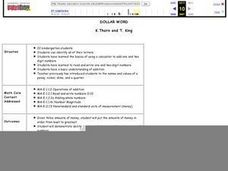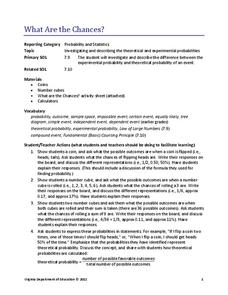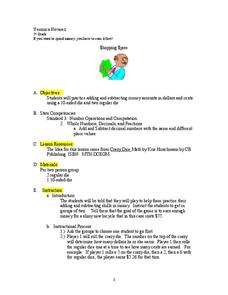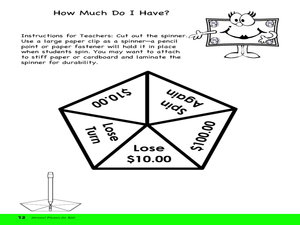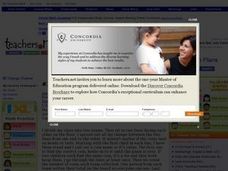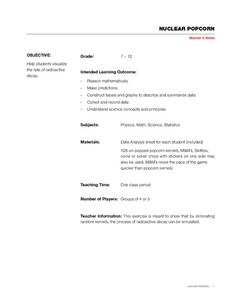Illustrative Mathematics
Heads or Tails
Heads! A great way to practice probability is to flip a coin in class. The provided data allows your mathematicians to predict the probability of heads in ten coin flips. Bring coins to class and allow your own trial of heads or tails....
Curated OER
Penny Jar
Students collect pennies to donate to charity and calculate the number of pennies. For this penny counting lesson, students group pennies in tens and count how many dollars and cents they have. Students read a book about money....
Curated OER
Money for starters
Students compare the values of coins and paper money. They read prices, read and write any 2-digit number. They model and explain addition calculations with a sum of up to 20.
Curated OER
How Rich Is Rich?
Second graders read "Alexander, Who Used to Be Rich, Last Sunday" by Judith Viorst. They watch a video of the book and identify and record amounts of money mentioned in the story. They investigate money-related websites.
Curated OER
NUMB3RS Activity: Financial Futures
High schoolers discuss the calculated risk example in Numb3rs about a businesswoman from a company that made its money trading in futures. They use a formula given by the teacher to compute the estimated value of an investment after...
Curated OER
Dollar Word
Students review the value of coins prior to adding up values to equal one dollar. Letters of the alphabet are assigned monetary values and students use calculators to add up the value of a word. Students work with a partner to try and...
Curated OER
Musical Note Value
Students will identify each symbol by sight stating the value of each. They will use cardboard notes to who what they have learned so far about the note values creating 4 and 6 count phrases.
Curated OER
Penny Pushing
Fifth graders use an Excel spreadsheet to show them how to enter the amount of pennies they bring each week to school for a fundraising project. They count their pennies each Friday and enter the total amount in the correct columns. In...
Virginia Department of Education
What Are the Chances?
Take a chance on an informative resource. Scholars conduct probability experiments involving coins and number cubes to generate data. Compiling class data helps connect experimental probability to theoretical probability.
Curated OER
Shopping Spree
Sixth graders examine currency by completing monetary equations. In this economics instructional activity, 6th graders participate in a numbers experiment where they roll a die and earn money based on their roll. Students compete for...
Curated OER
Wealth
Third graders read the story The Day I Was Rich and learn about the role of money and taxes. In this money lesson plan, 3rd graders count large sums of money, group them, and give it away in the form of taxes. They discuss wealth and how...
Curated OER
The Price is Right, So Let's Make Change
Students estimate, calculate, and count back the amount of change needed from purchases made during small group activities.
Curated OER
Fraction Conversions
Young scholars convert between fractions, decimals, and percents using money. In this conversions lesson plan, students play with a mock store in class.
Curated OER
Problem Solving
Young scholars use hockey sticks to pick up bean bags and put them into hoops which they get money for in the end. In this movement and math lesson plan, students get fake money and add up how much they earned in the end based on how...
Curated OER
Shopping with Money
Young scholars apply their knowledge of addition and subtraction of money into real life situations.
Curated OER
Introduction of the Quarter
Students discuss the quarter. In this money lesson, students find the value and characteristics of the quarter. They see how many pennies it takes to equal one quarter.
Curated OER
Number and Operations- Using Gift Certificates
Students apply number and operation skills to learn how to spend a gift certificate. In this mathematical reasoning lesson, students use base 10 blocks as money and calculate how much money they have.
Curated OER
Learning with Links
Students explore the concept of counting, measuring, and estimating. In this counting, measuring, and estimating lesson, students use plastic links to count sets of links. Students measure their arms and legs using links.
Curated OER
Coin Hunt and It's Variations
Students play a game designed to give them practice identifying coin names and values. They form two lines with coins spread out in between the teams and when the teacher calls out a coin, the two in front scramble to find the specified...
Curated OER
Value Your Digits
Third graders work with place value. In this place value lesson, 3rd graders write three digit numbers and tell the place value of each number. They compare numbers and money, regroup, discuss the value of coins, and count money.
National Museum of Nuclear Science & History
Nuclear Popcorn
Make your lesson on radioactive decay pop with this lab exercise. Using popcorn kernels spread over a tabletop, participants pick up all of those that point toward the back of the room, that is, those that represent decayed atoms. As the...
Curated OER
Counting by 10s, 5s, and 1s
Students practice counting by 10s, 5s, and 1s in order to prepare for counting and adding the values of coins.
Curated OER
Math-Money
Students complete money matching worksheet. They work with an aid or peer tutor with coin tray, name each coin shown (use native language or alternative speech method). Alternative assessment methods are used.
Curated OER
Count Your Pennies
Students analyze and compare imagery and symbolism in ancient Greek and contemporary U.S. coins.







